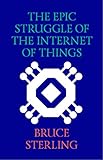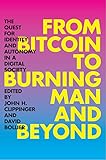Summary
I finished reading three things this week that all tied together in my mind and so I wanted to mention them. One is a full-length book, but the other two are short essays. This post describes them and my thoughts about how they relate to my earlier post on the CompuServe of Things.
I finished reading three things this week that all tied together in my mind and so I wanted to mention them. One is a full-length book, but the other two are short essays.
 Jefferson and Hamilton: The Rivalry That Forged a Nation
by John Ferling—I'm a fan of early American history and have read a lot about Jefferson (including Malone's six volume biography) and some about Hamilton. What was interesting about this volume was seeing the lives of the two foes play out in parallel and focusing on their interaction. The take away for me was they were both right. A contradiction, but one that is still played out daily in US politics. We need national strength (Hamilton) and democracy (Jefferson) even though those things are diametrically opposed and must be carefully balanced.
Jefferson and Hamilton: The Rivalry That Forged a Nation
by John Ferling—I'm a fan of early American history and have read a lot about Jefferson (including Malone's six volume biography) and some about Hamilton. What was interesting about this volume was seeing the lives of the two foes play out in parallel and focusing on their interaction. The take away for me was they were both right. A contradiction, but one that is still played out daily in US politics. We need national strength (Hamilton) and democracy (Jefferson) even though those things are diametrically opposed and must be carefully balanced.
Hamilton is clearly the winner in the way history played out. He got his strong federal government and manufacturing-based society. Jefferson's dream for an agrarian society has faded with the 19th century. But his reason for wanting it—fear of the concentration of power and corruption (in the Lessig sense) that industry would bring—was spot on. Which brings me to the next two short essays.
 The Epic Struggle of the Internet of Things by Bruce Sterling—This little essay will cost you $2.99 at Amazon, but it's worth it. Sterling lays bear the fallacy of the Internet of Things based on goods sold to us by the powers-that-be (namely the big five: Google, Apple, Facebook, Amazon, and Microsoft) and their lesser counterparts. The behemouths don't compete with each other, they seek to disrupt others in ways that are not connected with any free market that you're familiar with. We're up in arms about the NSA spying on us, but all too willing to sign up for surveillance from peddlers of connected things. Our freedom and independence as human beings is at stake, as I wrote about in The CompuServe of Things. How do we escape and regain our independence (the democracy that Jefferson fought for)? Read on.
The Epic Struggle of the Internet of Things by Bruce Sterling—This little essay will cost you $2.99 at Amazon, but it's worth it. Sterling lays bear the fallacy of the Internet of Things based on goods sold to us by the powers-that-be (namely the big five: Google, Apple, Facebook, Amazon, and Microsoft) and their lesser counterparts. The behemouths don't compete with each other, they seek to disrupt others in ways that are not connected with any free market that you're familiar with. We're up in arms about the NSA spying on us, but all too willing to sign up for surveillance from peddlers of connected things. Our freedom and independence as human beings is at stake, as I wrote about in The CompuServe of Things. How do we escape and regain our independence (the democracy that Jefferson fought for)? Read on.
 Why Self-Sovereignty Matters by John Clippinger—This is Chapter 2 in a collection of essays edited by John H. Clippinger and David Bollier called
From Bitcoin to Burning Man and Beyond: The Quest for Identity and Autonomy in a Digital Society (free PDF) John does a nice job of laying out in non-technical terms how we can be the source of our own identity (what is known as sovereign-source identity or self-sovereignity) rather than only being identified within the administrative domains of the Big Five, the Government, and other lesser administrations. This comes off as arcane, but it has a simple premise: why aren't you the source of your own identity? Why are all your identifiers given to you by others? This is the fundamental roadblock to true independence online and one that greatly interests me.
Why Self-Sovereignty Matters by John Clippinger—This is Chapter 2 in a collection of essays edited by John H. Clippinger and David Bollier called
From Bitcoin to Burning Man and Beyond: The Quest for Identity and Autonomy in a Digital Society (free PDF) John does a nice job of laying out in non-technical terms how we can be the source of our own identity (what is known as sovereign-source identity or self-sovereignity) rather than only being identified within the administrative domains of the Big Five, the Government, and other lesser administrations. This comes off as arcane, but it has a simple premise: why aren't you the source of your own identity? Why are all your identifiers given to you by others? This is the fundamental roadblock to true independence online and one that greatly interests me.
In my blog post on the CompuServe of Things, I wrote:
On the Net today we face a choice between freedom and captivity, independence and dependence.
I really believe that. I don't hate the Big Five. I love their products and use them regularly, but I want to do so as an independent entity with inalienable rights, not as a serf in their digital estates.




